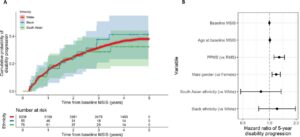
“Polygenic burden of short tandem repeat expansions promote risk for Alzheimer’s disease.”
Michael Guo, et al – University of Pennsylvania.
Background: While AD risk is highly heritable, changes to individual DNA bases or small insertions/deletions only explain part of this heritable risk, suggesting that other genomic elements can influence AD risk. Short tandem repeats (STRs), which are stretches of DNA repeating the same ~2-6 base pair sequence, in protein-coding sequences have been implicated in monogenic disorders such as Huntington’s Disease, while polygenic STR burden has been linked to autism spectrum disorder and schizophrenia risk.
This Study: Guo and colleagues examined STRs in blood samples taken from 1,489 patients with AD and 1,492 matched controls. There was a mean of 6.27 and 5.27 STR expansions in AD cases versus controls, representing a 1.19-fold higher burden of STR expansions in cases. However, subjects with the highest levels of repeats had sharply elevated odds ratios for AD.burden, rising to 3.62 for those with >30 STRs. The overwhelming majority of these STRs, in both AD subjects and controls, fall outside of protein-coding sequences, suggesting that they influence AD risk by regulating nearby genes. AD-associated STRs were biased towards being near transcriptional start sites, with nearby genes being enriched for neuron-specific pathways.
Bottom Line: STRs may represent a previously-unexplored mechanism by which the genome influences AD risk.




